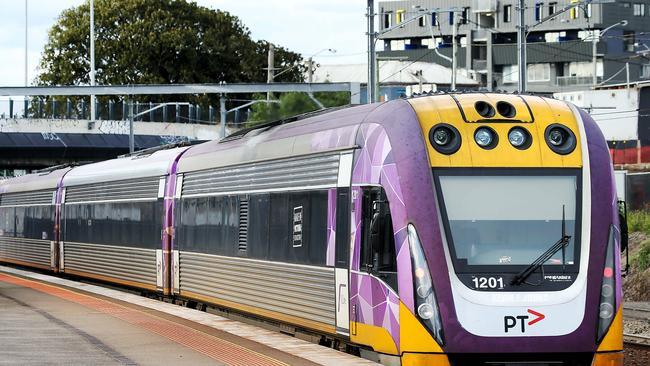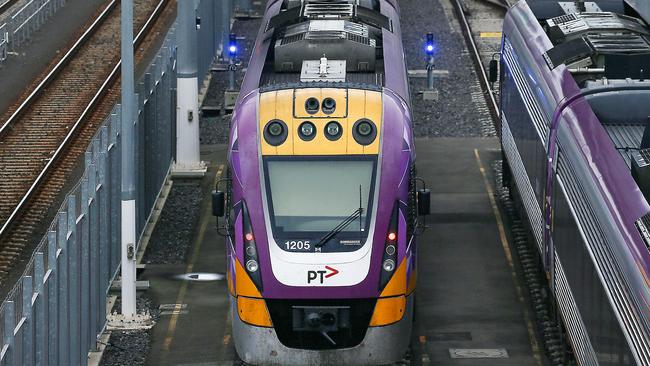Regional leaders praise move to slash V/Line fares from March
Reduced regional fares will bring huge cost savings for Victorians, but advocates believe there is one key piece missing from the puzzle.

Leader
Don't miss out on the headlines from Leader . Followed categories will be added to My News.
Cheaper train fares are only the first step to creating a better public transport system for regional Victorians, leaders say, as they call for more frequent services.
An election promise in the lead up to the 2022 state election, the Andrews Labor government has confirmed its commitment to capping V/Line prices at the same price as metro daily fares from March 31 this year.
The new costs – $9.20 for a full return fare and $4.60 for concession – will make it much cheaper for regional residents to commute, attend appointments or visit friends and family without piling into a car.
Regional fares are currently calculated based on distance travelled, meaning a return trip between Geelong and Melbourne can cost more than $27, a ticket from Ballarat more than $45, more than $53 from Shepparton and more than $68 from Bendigo.
Public Transport Users Association’s regional spokesperson Paul Westcott welcomed the move.
He said a family of four travelling from Melbourne’s Southern Cross Station to Warrnambool would currently pay about $157.60 for the trip, but once the cap was introduced they would only need to fork out about $27.60.
“That’s a saving of $130, so it’s a massive saving,” he said.
Andrea Metcalf, chair of Regional Cities Victoria – which comprises advocacy voices from Ballarat, Bendigo, Geelong, Horsham, Latrobe, Mildura, Shepparton, Wangaratta, Warrnambool and Wodonga – said the new prices would make people think about whether it was more feasible to take public transport.
“Regional Victoria is home to almost one and a half million people – almost a quarter of all Victorians. So having access to affordable and good public transport is really important,” she said.
Ms Metcalf said the move would also make it more viable for those who had already moved to the regions, or those who wanted to, to continue their employment in Melbourne with more affordable fares to commute to the office.
“This will bring big savings for people to get into the city, but also to get out of the city,” Ms Metcalf explained.

Also mayor of the City of Greater Bendigo, she praised plans for increased weekend services for the regional rail network in the hope it would boost regional tourism.
“It gives people from metropolitan areas the opportunity to come out to the regions to see what we have to offer,” Ms Metcalf said.
Committee for Ballarat chairman George Fong said the initiative fit into the western region’s long-term strategies, with the benefits ranging from enhancing tourism to boosting employment and strengthening education and healthcare outcomes.
“We’re really interested in looking at how the behaviour of commuters, tourists and students changes,” Mr Fong said.
“Not just from Melbourne to Ballarat and vice versa but from Ballarat to Ararat, Horsham and the other regions around the area.
“We think that’s going to be tremendously important as we lead up to milestone events like the Commonwealth Games.”
But while all agreed the fare decrease was welcomed, Mr Westcott outlined one concern.
“Our concern now, assuming that increase in patronage as a result of these fare cuts, is whether the number of services and the capacity of them will be sufficient to cater to the extra passengers wanting to travel,” he said.
“We haven’t seen any information from the government about increasing services in order to match what it surely will be.
“We’d like to see some further commitments.”
Mr Fong said while train services had improved between big regional centres such as Ballarat and the big smoke in recent years, the next push needed to be improving connectivity between regional cities as well as better connecting major regional centres and smaller rural towns to improve liveability.
He said it was “no big secret” that many regional businesses were desperately short of staff.
“In places like Ararat we have world-leading businesses such as AME systems, which produces wiring looms for military vehicles and for airliners and they’ve always been desperate to get more people in.”
Acknowledging both housing shortages and retaining staff in the long-term as other factors making employment in regional areas more of a challenge, he said the option for staff to work from home for half the week and then commute to the office for the remaining days could enhance a lot of businesses operating outside of peri urban areas.
He added that education and healthcare could also become more accessible with better connectivity.
“Ballarat is a university town and the ability for us to engage with the student population outside of Ballarat and in the regions is very important to us.
“Covid has improved the ability to connect remotely but part of the university experience is actually being physically on campus.
“It will enhance the ability to educate our region.”
Explaining the region had a “very large health service” that stretched to Horsham, he said accessibility could be a challenge.
“The ability to move people up and down more easily across those rail lines will improve the ability for patients to meet up with specialists, for example, when it’s needed.
“And what we’re hoping is that it will go the other way as well – that health professionals might find it easier to commute into these regions and services.”
The state government is investing $207M to increase the frequency of weekend services on major regional Victorian train lines, with plans for them to be introduced in stages from 2024.
While there are no immediate plans to proactively address increased patronage by running extra services, the Department of Transport and Planning is working to understand the “likely impact of the fare change” and “if additional services will be required”.
“Since 2015, we’ve added more than 800 extra services to the V/Line network – including more than 70 on weekends. From next year, we’ll introduce even more weekend services to the network to cater for growing patronage on our regional rail,” a spokesperson said.
“We’ve promised to cap V/Line daily fares at the same price as a metro daily fare by 31 March – making V/Line fares fair, and making public transport accessible to Victorians in every corner of our state.”




